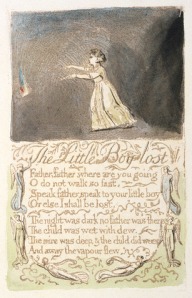M wrote:
From first reading through the poems of William Blake’s ‘Songs of Innocence & Experience,’ I found that some of the poems were clearly related to the title of the collection, and others seemed to have a more abstract take on the idea of ‘Innocence and Experience’.
For example, the poem titled ‘The Chimney Sweeper’ gave an immediate impression of a young, vulnerable child within the opening few lines of the first stanza. The beginning of the poem seemed to have a strong focus upon innocence and was suggestive of the fact that the young boy had a considerably lack of experience because of his age, ‘weep weep weep weep’. The repetition of the dynamic verb ‘weep,’ seems really powerful within the opening of the poem, because it suggests that the young chimney sweeper is innocent and vulnerable, possibly because of the experience of his mothers death and his father’s suggested dismissal of him.
In contrast to this, the poem titled ‘The Clod & the Pebble’ didn’t seem to give any impression of being relatable to either innocence or experience when initially reading through the poem. The concepts within the poem seemed very abstract, and the idea of the poem portraying a sense of ‘experience’ was something that I did not find immediately obvious. When thinking about this poem further, it seems to be relatable to love and relationships, and a possible interpretation of this poem would be that it is a metaphor, and is representative of the experience that love can give you, but is hidden within a more simple concept of ‘The Clod and the Pebble’.
T wrote:
FIRST THOUGHTS ON POEMS
As a group, we decided to read through all of the poems first before stopping to analyse them. Obviously, the common theme through the first half was innocence however it proved to us that sometimes it is hard to identify what the link to innocence or experience in the second half was. For example in songs of innocence a lot of the poems seemed to be to do with youth, either portrayed through children or animals (lamb) or even simply young minded. I thought that some of the poems seemed sad e.g. the chimney sweeper. I enjoyed reading the poems further to see how they linked and connected because reading through all of them gives you a better first understanding than analyzing deeply into one after a first look at it. Our group brought up the question of whether our original views of what innocence and experience was were changed after reading the poems. Sometimes, we found it difficult to understanding what was going on in the poems, I found it confusing that there is no definite beginning, middle and end like a story has. I think the poems try to get information across without saying it directly, I get this opinion because some of the poems do not link and connect.


